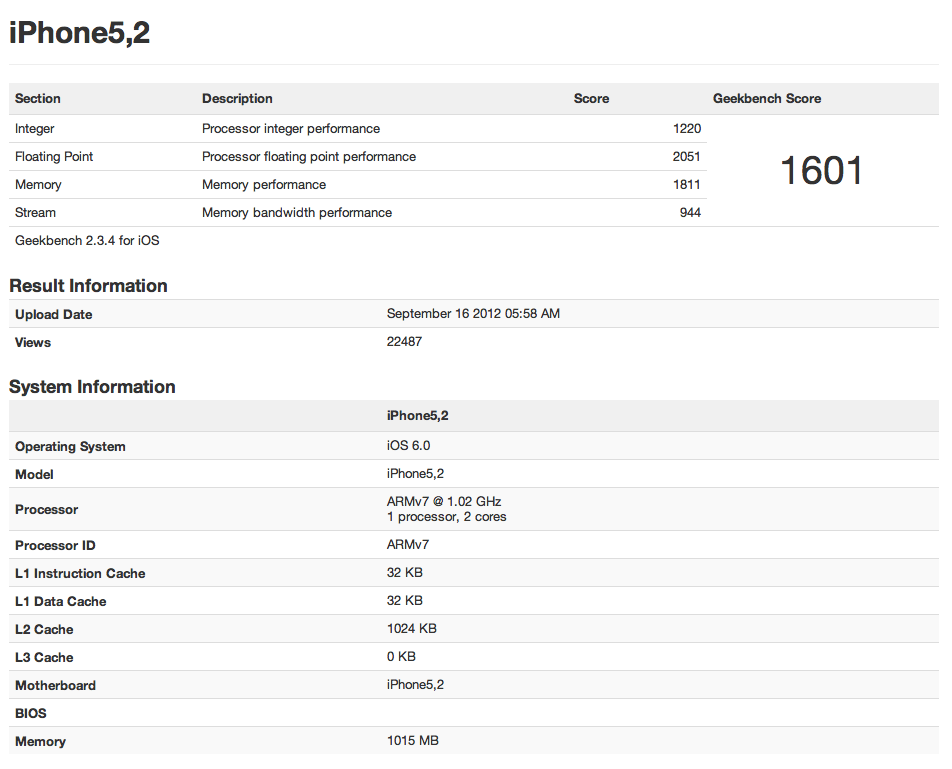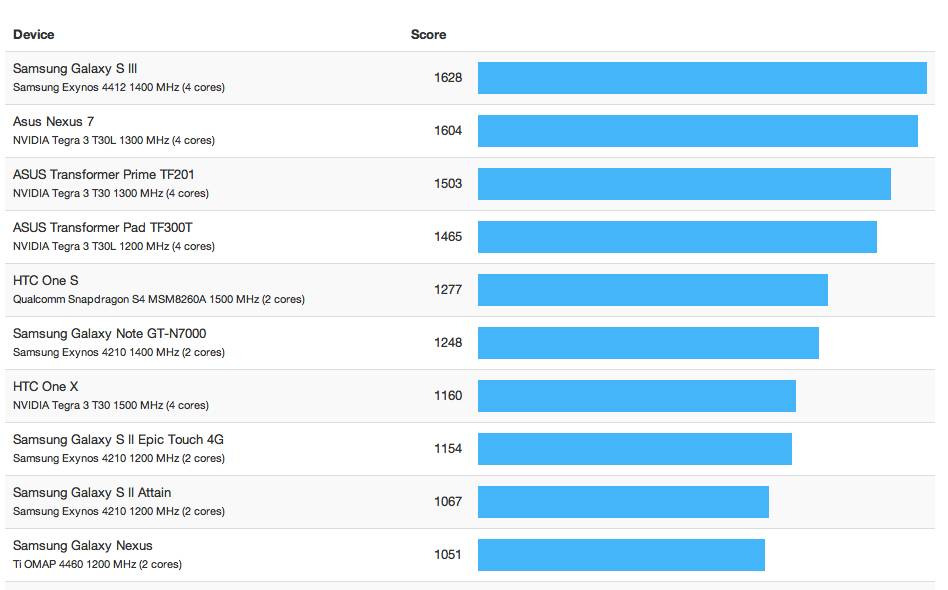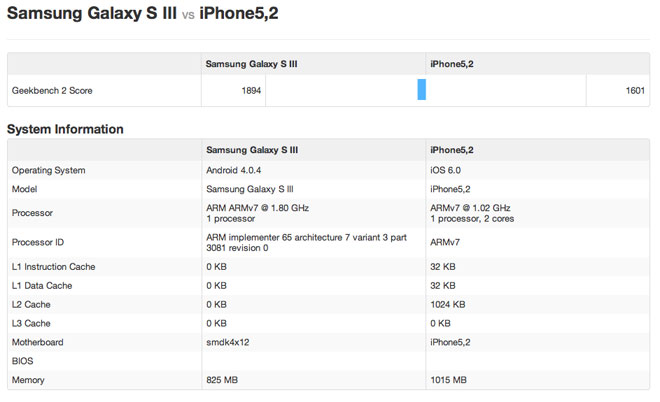For power users, It all boils down to specs, when smartphones are put to fight head-to-head. Even though Benchmarks are synthetic, they can reveal a lot of phone’s performance in real world.
Geekbench, a cross platform benchmarking tool has been used to measure the performance of industry’s leading smartphones and Tablets. The results are very different from one would imagine. 
Update: We now have handson Complete iPhone 5 Benchmarks: CPU, GPU Graphics, Browser Performance vs. Android vs. iOS
iPhone 5 Benchmarks
iPhone 5 scores a score of 1601 on Geekbench. The iPhone 5 uses a custom Apple A6 ARMv7 processor which is NOT A15 as previously estimated. Also appears to be clocked higher than the A5 at 1GHz (the iPhone 4S A5 ran at 800Mhz). A6 has on-chip 1GB DDR RAM, which is half of Galaxy S3, but double of iPhone 4S. Here are the details of iPhone 5 floating point, integer, memory and bandwidth performance: 
iOS Benchmarks (iPad 3, iPad 2, iPhone 4S, iPhone 4)
The iPhone 4S scores 629 and the average score for the iPad 3 is 766. The numbers seem to validate Apple’s claim that the A6 processor is twice as fast as the A5 and any previous iOS device. 
Galaxy SIII and other Android Benchmarks
iPhone 5 vs. Galaxy SIII Performance
iPhone 5 with Dual-core A6 scores 1601 and Galaxy SIII with quad-core Exynos scores 1628, which is only slightly higher to quad-core Tegra 3 Nexus 7 Tablet.
Update: As per another user-submitted benchmark, S3 scores 1894, which is way higher than anything in its competition. (Benchmarks source)
What’s wrong with these Benchmarks
First of all benchmarks by industry definition are supposed to be done under same or similar conditions: This essentially means: similar OS architecture, underlying platform. Since Android & iOS are totally two different platforms (Android apps run in Dalvik VM that translates to native calls vs. native on iOS), its hard to compare hardware performance against each other with good amount of accuracy. Benchmarks are designed to mimic a particular type of workload on a component or system, they do not reveal real-world performance results.
Synthetic benchmarks do this by specially created programs that impose the workload on the component. Hardware benchmarks run real-world programs on the system. While application benchmarks usually give a much better measure of real-world performance on a given system, synthetic benchmarks are useful for testing individual components, like a hard disk or networking device.
Synthetic benchmarks certainly have their usefulness since the data and performance is capable of being replicated on several different machines. It is also useful since in the world of reviews the reader very rarely has a system identical to that in the review. In such cases the synthetic benchmark allows the reader to test their system against the numbers provided in the review to gain an idea once again of relative performance.
Secondly, Geekbench, although written to be compatible with multi-processor architecture, truth be told, Geekbench 2 doesn’t use Four cores on the quadcore Android smartphones like Galaxy S III. Truth be told, only few apps on Android use all 4 cores. Most of the time, they are idle.
Other than that Samsung Stock Android ROM may not be tuned for performance. With few modifications to OS, performance can be increased 1.5x fold, easily. So simply, when you use Geekbench to compare iPhone 5 vs. Galaxy SIII, the results would be misleading.
The performance obtained from Synthetic benchmarks are essentially reflection of OS and environment performance than hardware alone.
e.g. Here is my Galaxy Note N7000 (Dual core Exynos 1.4Ghz running tuned ParanoidAndroid ROM) It clearly offers synthetic performance of HTC One X’s Quad-core Tegra 3 1.5Ghz. In real world, this doesn’t mean that my phone’s dual core is faster than quad core.
If that isn’t enough to convince you, here comes Galaxy Note N7000 (overclocked to 1.6Ghz) benchmarked on GeekBench 2.
Clearly, thats equivalent to performance of Asus Transformer Prime with quad-core CPU, and nearly 1.7x times faster than iPad 3.
VERDICT
Synthetic benchmarks are synthetic. We need to wait a bit longer till we can see real-life games and compute performance. For now, synthetic benchmarks declare Galaxy SIII as the winner followed by Nexus 7, and iPhone 5 taking the third place.
Related: Cost to manufacture iPhone 5 is $167.
We write latest and greatest in Tech Guides, Apple, iPhone, Tablets, Android, Open Source, Latest in Tech, subscribe to us @geeknizer on Twitter OR Google+ or on Facebook Fanpage
loading...
loading...





First of all, benchmarks don’t run on Dalvik, benchmarks are compiled into native code both on iOS AND Android, so it’s a irrelevant comment.
Secondly, Geekbench DOES use all four cores of the Galaxy S3 and N7, this can be plainly seen by switching off different cores and seing the benchmarks vary. Geekbench constitutes also single-threaded tests though which account for a fair amount of the final score so multi-cores don’t scale linearly with the score. That and also the memory bandwidth tests which are core-independent.
Thirdly, as you may noticed, the real scores of these Quad-core phones/devices is always higher than the average of the result database, because Geekbench in its nature is a very short benchmark, and processor power-management may lag into turning into all of the cores. In a “warmed up” state the score is higher, as you have posted. The average Geekbench score for the S3 for example grew a good 50 points since yesterday since everybody and their mom started using it now since the iPhone results were out.
Also your Quadrant benchmark is absolutely useless as you are using a ROM which disabled file-sync to achieve a good 1500 points more then you should (that’s why your I/O scores are huge) which is basically cheating the scores and why no reputable site uses Quadrant.
loading...
loading...
This is an excellent post; you’re right!
loading...
loading...
We don’t have to wait to see how the phones perform during real world use. The 4 and 4s already ran the latest versions of iOS better than any Galaxy S3 I have yet used runs Android, Even the one that my friend John had rooted and OC’d so high that I thought I would get 3rd degree burns from it. The 5 will be just that much smoother.
loading...
loading...